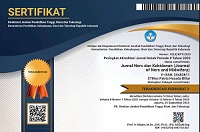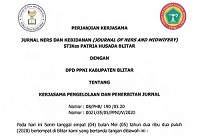Coping Mechanism in Women with Breast Cancer
DOI:
https://doi.org/10.26699/jnk.v6i3.ART.p408-411Keywords:
Coping Mechanism, Women, Breast CancerAbstract
Background: Impaired coping mechanisms often occur in women with breast cancer. The purpose of this study is to determine the description of coping mechanisms in women with breast cancer who undergo chemorepy, radiation or both.
Methods: The population in this study were women with breast cancer who underwent chemotherapy, radiation or both. Sampling was done by random sampling where the number of samples is 70. Taking data using the COPE Brief instrument.
Result: Four indicators in the destructive category were acceptance (54.3%), denial (61.4%), emotional support (52.9%) and positive reframing (67.1%) while three indicators were mostly in the constructive category, namely self blame (60%), active (64.3) %), and Behavioral disengagement (72.9%).
Conclusion: Four destructive indicators indicate poor avoidance and positive thinking in breast cancer patients, while 3 constructive indicators describe good problem solving. Assessment based on this indicator can be taken into consideration in the selection of appropriate interventions to improve coping mechanisms in breast cancer patients.
References
Lake B, Fuller HR, Rastall S, Usman T. Breast Reconstruction Affects Coping Mechanisms in Breast Cancer Survivors. Indian J Surg. 2019;81(1):43–50.
Gibbons A, Groarke AM. Coping with chemotherapy for breast cancer: Asking women what works. Eur J Oncol Nurs [Internet]. 2018;35(June):85–91. Available from: https://doi.org/10.1016/j.ejon.2018.06.003
Stefanic N, Caputi P, Lane L, Iverson DC. Exploring the nature of situational goal-based coping in early-stage breast cancer patients: A contextual approach. Eur J Oncol Nurs [Internet]. 2015;19(6):604–11. Available from: http://dx.doi.org/10.1016/j.ejon.2015.03.008
Lotfi F, Vaziri S, Esmaeil M, Jamshidifar Z. Stress Coping Skills Training and Distress in Women with Breast Cancer. Procedia - Soc Behav Sci [Internet]. 2014;159:192–6. Available from: http://dx.doi.org/10.1016/j.sbspro.2014.12.355
Ling H, Chun L, Chu IC, Lu Y, Chun Y, Chiung Y, et al. Relationships among personality , coping , and concurrent health- related quality of life in women with breast cancer. Breast Cancer [Internet]. 2019;26(5):544–51. Available from: http://dx.doi.org/10.1007/s12282-019-00954-7
Aydiner A, Igci A, Soran A. Breast Cancer. USA: University of Pittsburgh Medical Centre; 2019.
WHO. Breast Cancer Facts and Figures. Atalanta; 2013.
World Health Organization. WHO | World’s health ministers renew commitment to cancer prevention and control. WHO. 2017;
Dinas Kesehatan Provinsi Jawa Timur. Profil Kesehatan Provinsi Jawa Timur Tahun 2016. Dinas Kesehat Provinsi Jawa Timur. 2017;182.
Castillo A, Mendiola J, Tiemensma J. Emotions and Coping Strategies During Breast Cancer in Latina Women : A Focus Group Study. 2019;17(3):96–102.
Jang M, Kim J. A structural model for stress , coping , and psychosocial adjustment : A multi-group analysis by stages of survivorship in Korean women with breast cancer. Eur J Oncol Nurs [Internet]. 2018;33(January):41–8. Available from: https://doi.org/10.1016/j.ejon.2018.01.004
Mattei VE Di, Carnelli L, Bernardi M, Bienati R, Brombin C, Cugnata F, et al. Coping Mechanisms , Psychological Distress , and Quality of Life Prior to Cancer Genetic Counseling. 2018;9(July):1–11.
Gok Z, Karadas C, Izgu N, Ozdemir L, Demirci U. E ff ects of progressive muscle relaxation and mindfulness meditation on fatigue , coping styles , and quality of life in early breast cancer patients : An assessor blinded , three-arm , randomized controlled trial. Eur J Oncol Nurs [Internet]. 2019;42(May):116–25. Available from: https://doi.org/10.1016/j.ejon.2019.09.003
Hagan TL, Fishbein JN, Nipp RD, Jacobs JM, Traeger L, Irwin KE, et al. Coping in Patients With Incurable Lung and Gastrointestinal Cancers : A Validation Study of the Brief. J Pain Symptom Manage [Internet]. 2017;53(1):131–8. Available from: http://dx.doi.org/10.1016/j.jpainsymman.2016.06.005
Drageset S, Christine T, Underlid K. “ I just have to move on †: Women ’ s coping experiences and re fl ections following their fi rst year after primary breast cancer surgery. Eur J Oncol Nurs [Internet]. 2016;21:205–11. Available from: http://dx.doi.org/10.1016/j.ejon.2015.10.005
Hernández R, Calderon C, Carmona-bayonas A, Gómez-camacho MDN, Beato C, Castelo B, et al. Differences in coping strategies among young adults and the elderly with cancer. 2019;1–9.
Cha S, Seo B. Smartphone use and smartphone addiction in middle school students in Korea : Prevalence , social networking service , and game use. Heal Psychol. 2018;
Cocorada E, Maican CI, Cazan AM, Maican M. Assessing the smartphone addiction risk and its associations with personality traits among adolescents. Child Youth Serv Rev 93. 2018;345–354.
Wang P, Zhao M, Wang X, Xie X, Wang Y, Lei L. Peer relationship and adolescent smartphone addiction: The mediating role of self-esteem and the moderating role of the need to belong. J Behav Addict [Internet]. 2017;6(4):708–17. Available from: http://www.akademiai.com/doi/10.1556/2006.6.2017.079
Haug S, Castro RP, Kwon M, Filler A, Kowatsch T, Schaub MP. Smartphone use and smartphone addiction among young people in Switzerland. J Behav Addict [Internet]. 2015;4(4):299–307. Available from: http://www.akademiai.com/doi/abs/10.1556/2006.4.2015.037
Hussain Z, Griffiths MD, Sheffield D. An investigation into problematic smartphone use: The role of narcissism, anxiety, and personality factors. J Behav Addict [Internet]. 2017;6(3):1–9. Available from: http://www.akademiai.com/doi/abs/10.1556/2006.6.2017.052
Downloads
Published
How to Cite
Issue
Section
License
Copyright (c) 2019 Jurnal Ners dan Kebidanan (Journal of Ners and Midwifery)

This work is licensed under a Creative Commons Attribution-ShareAlike 4.0 International License.






